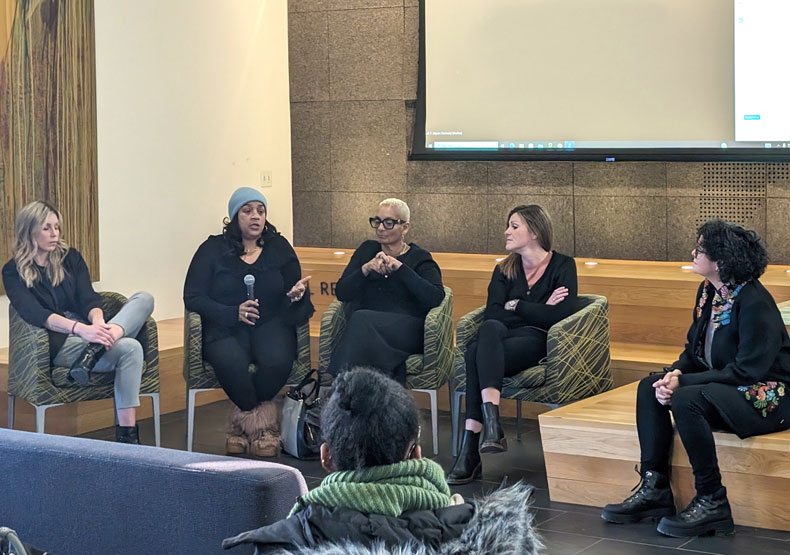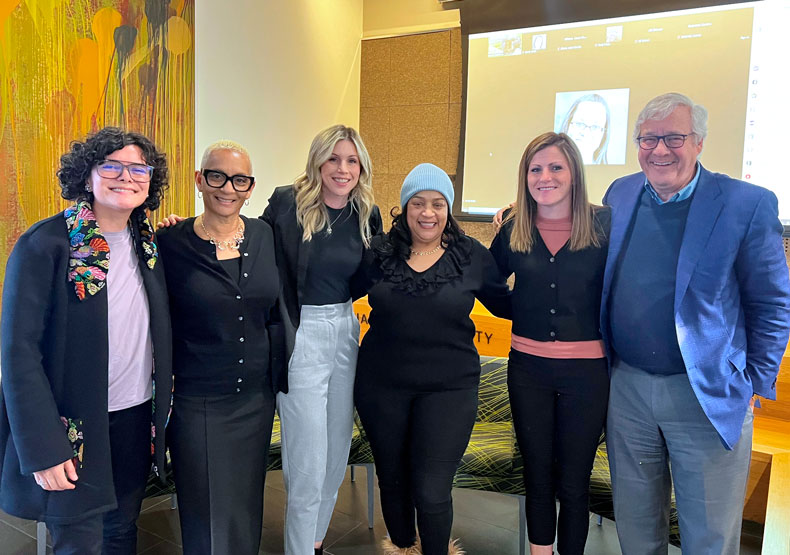The Power of Listening: William James College Convenes Community Conversation During Human Trafficking Awareness Month

In communities across the country and around the globe, human trafficking remains a predatory crime affecting more than 27 million individuals—the vast majority of whom are women and girls. Each January since 2010, when former President Obama declared January “National Slavery and Human Trafficking Prevention Month'', organizations and individuals have coalesced around a trio of goals—that include understanding the root causes of human trafficking, bringing traffickers to justice, and supporting survivors as they endeavor to rebuild their lives—by spreading awareness and increasing education surrounding the pervasive and violent crime that is human trafficking, one that disproportionately affects members of racial and ethnic minorities, the LGBTQIA+ community, and migrants. On January 22, a lunchtime Q&A convened on campus with a panel of frontline experts (hosted by the Counseling and Behavioral Health Department and the Human Trafficking Community Research Hub (HTCRH), moderated by Paola M. Contreras, PsyD, Associate Professor, Counseling and Behavioral Health Department. Panelists included Stacey Reed, MSW, Leadership Psychology PsyD student, HTCRH, Lead Research Assistant, and Director of Mentorship and Advocacy at RIA, Inc.; Audrey Morrisey, co-executive director of My Life My Choice; Shay Valentine, MA, Clinical Psychology PsyD student, HTCRH Research Assistant, Board of Advisors, Crossing Points Arts; and Audra Doody, MA, co-executive director, Safe Exit Initiative. The candid conversation, hinging largely on the survivor-leaders’ lived experience and expertise advocating on behalf of survivors, underscored a single albeit simple truth: For individuals who have been prostituted and trafficked, commercial sex is neither a job nor a choice. All on the panel clarified that today’s conversation was not about people who choose to become sex workers and who likely have choices if they decide to exit. “Most of those people have college degrees, the people we are talking about usually don’t have that, they are struggling with poverty, homelessness, and often times drug addiction,” one panelist noted.
“There is no such thing as sex work for a child,” said Morrisey, underscoring the importance of language, something that’s evolved over the two decades she has spent working with youth—86% of whom are in the child welfare system. “Nothing makes a child more vulnerable than being removed from their family,” she said of an all-too-familiar scenario that sets the stage for these young people to look for love and belonging in all the wrong places. The remaining panelists chimed in with what they feel the public should know about the often silent topic of human trafficking.
“Individuals can’t shut [these experiences] off like a switch,” said Reed, emphasizing that—especially for those over the age of 18— getting services in Massachusetts can be challenging, especially when addiction is involved. “I needed someone to tell me that I mattered,” she continued, pointing to how mentorship could have interrupted the cycle of shame and blame she experienced as a young person.
“[Individuals who are being manipulated often] don’t present as victims when they show up for [help]; they don’t use the language of sex trafficking,” said Valentine, pointing instead to control and confusion leading the way, both of which fuel the stigma surrounding what many believe is a choice for these women and girls.
“What will end the sex trade and human trafficking is focusing on the demand…and targeting [buyers of these illegal services] from the beginning,” said Doody pointing to The Emma Coalition, a survivor-led initiative working to dismantle systems of violence against people who have been prostituted using the Equality Model—a comprehensive approach to abolishing the sex trade by repealing laws that criminalize individuals who are prostituted; providing survivors suitable exit programs; and penalizing those perpetrating the trafficking in the first place.
All highlighted that law enforcement has come a long way in their knowledge about human trafficking, but some still need more training. The consensus was that Massachusetts is moving in the right direction to address the problem of human trafficking, yet gaps remain. For instance, some on the panel emphasized that sex buyers are often protected, while trafficked people continue to be criminalized in some cases. As such, the survivor-leaders remain laser-focused on advocacy and support.
“We meet [survivors] where they are at in the process and [work to provide] the help they are asking for,” said Reed, noting a range that includes everything from posting bail and paying fines to seeking a safe haven or pursuing medical treatment—without judgment—in order to forge ahead and achieve a better quality of life. All are quick to emphasize that calling the police is not typically the initial approach for vulnerable populations, many of whom do not trust the judicial system due to their own lived experience. In the meantime, other solutions are promising and can ready people to later press charges against their trafficker.
“We know that mentoring works,” said Morrisey of her organization’s ongoing efforts to pair exploited youth with adult women, most of whom were recruited into the commercial sex industry when they were children, in a one-on-one mentoring relationship. Doody credits survivor mentorship as helping her to exit “the lifestyle” back in 2014. “[My mentor] was the first person to tell me I was actually worth it,” she said, underscoring the importance of helping survivors to rebuild their lives in the midst of a crisis fueled by substance use disorder, undiagnosed mental health issues, and homelessness—all of which leave individuals at increased risk of being preyed upon by traffickers.
“We try to operate as a community,” said Reed, emphasizing ways in which the public can get involved in calling for an end to human trafficking in Massachusetts. She suggested supporting organizations aimed at helping survivors exit trafficking and avoid recidivism; flooding social media with information and resources; and speaking up.
“Word of mouth spreads faster than anything else: If you see something, say something,” said Reed, imploring folks to change the narrative surrounding secrets and snitching, especially in families. As Massachusetts legislators work with survivors to pass The Sex Trade Survivor’s Act (which seeks to decriminalize the prostituted person and prosecute the trafficker), spreading awareness and increasing education remains top of mind—especially among vulnerable youth at risk of being lured into unhealthy situations.
“We’re talking about harm reduction,” said Valentine, an advocate for normalizing, rather than shying away from, uncomfortable conversations. In therapeutic scenarios, Morrisey addressed how to broach the topic of human trafficking “in the room” if a provider suspects a client is at risk:
“Just ask the question [on the intake form],” said Morrisey of an approach that, above all else, opens critical lines of communication. “The bottom line is, you let them know that by asking that [question], you can handle the answer,” she said of a process that ultimately creates safe spaces for all youth. Another question from the audience hinged on how best to support someone who is being trafficked, despite gaps in therapist knowledge.
“How you are asking the question really matters,” said Doody, underscoring the importance of language, including physical body language, and never challenging the relationship a survivor has with their abuser. Rather than criticize their choices, acknowledge their strength by praising the courage it takes to survive. Finally, Valentine implored practitioners to remember:
“Giving away info is like giving away a safety net, it’s a process [for the survivor],” one that must be handled with care and sensitivity.
In closing, Contreras tasked the audience to employ the best front-line tool in the current fight: “Listening is a profound and life-changing act for people who have never been listened to,” she said, pointing to the panel of leader-survivors as invaluable resources to help anyone they suspect might be experiencing sex trafficking.
“Don’t get in another lane just to try to save somebody,” said Reed. “If you don’t have the kind of lived experience [a survivor is opening up about], the best thing to do is listen and allow them to share where they are at.”

NOTE: Invaluable resources abound—a sliver of which we share here:
Need help now? Call the U.S. Human Trafficking Hotline at 1-888-373-7888 or text “BeFree” to 233733; a live chat function is also available on the Polaris website.
The Polaris Project is targeting the systems that make human trafficking possible.
MA Coalition to End Human Trafficking provides an Allies Database and News Article Database among other resources.
This digital toolkit — including an animated PSA designed to help the public recognize some of the signs of labor trafficking, in particular — is available from the Massachusetts Attorney General’s Office
Topics/Tags
Follow William James College
Media Contact
- Katie O'Hare
- Senior Director of Marketing
- katie_ohare@williamjames.edu
- 617-564-9389
